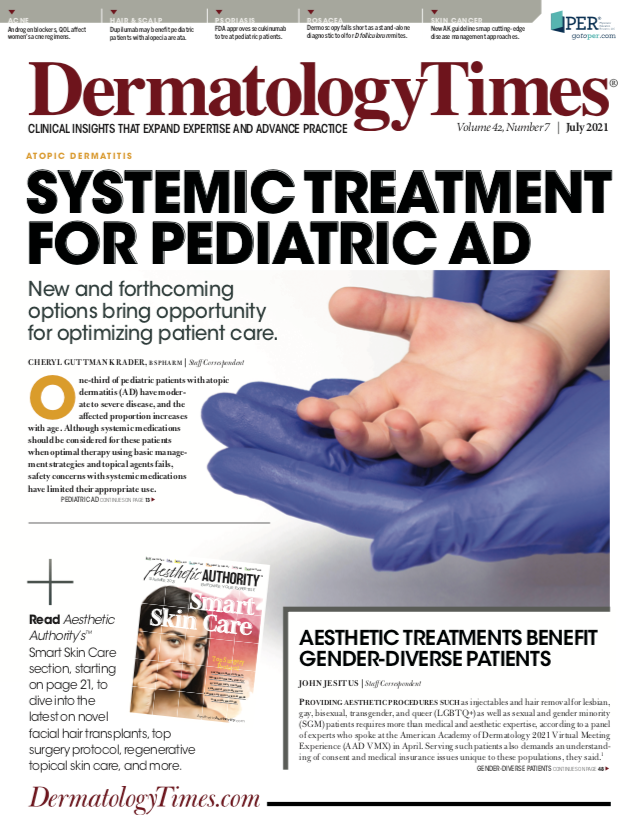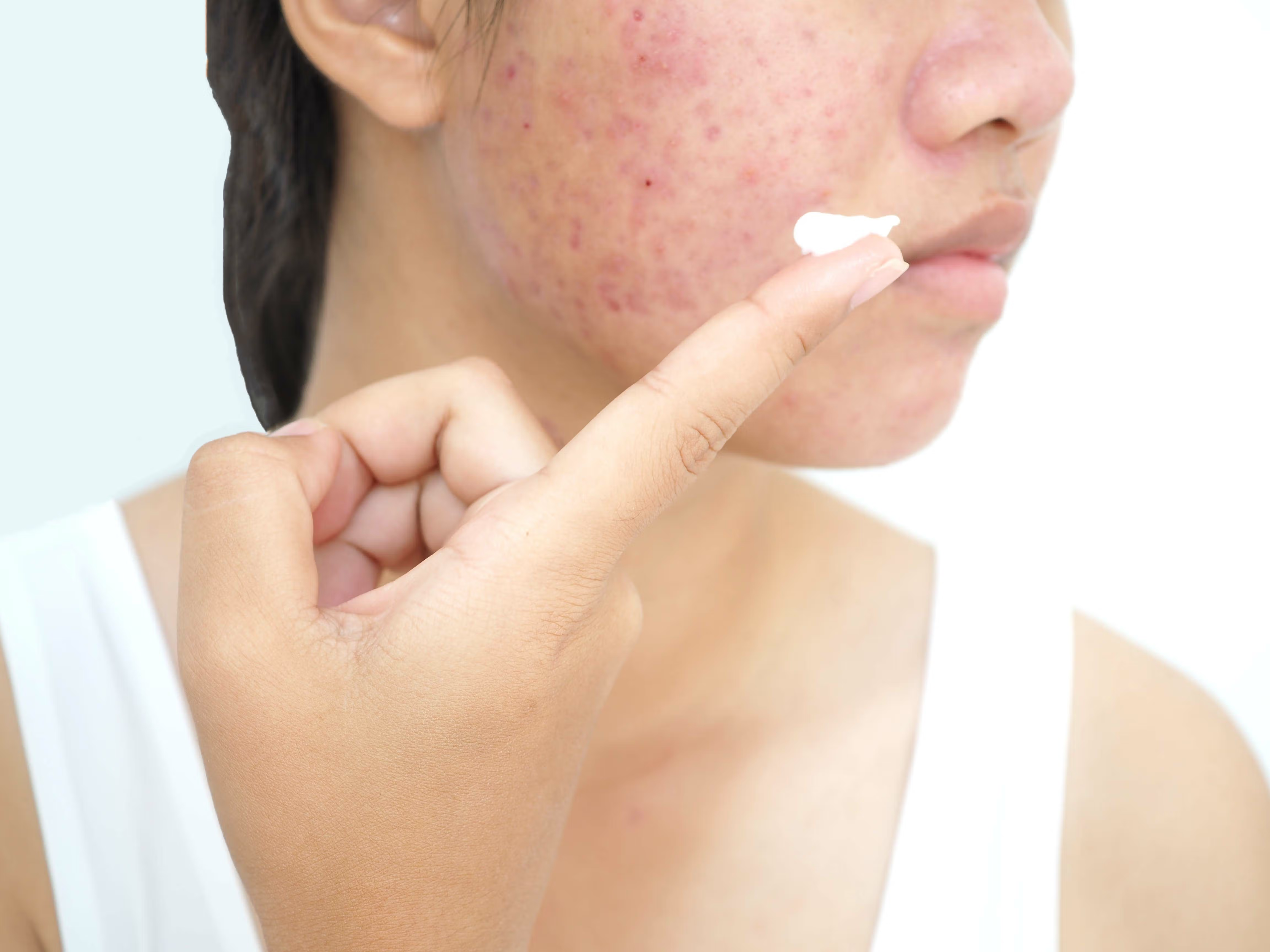- Case-Based Roundtable
- General Dermatology
- Eczema
- Chronic Hand Eczema
- Alopecia
- Aesthetics
- Vitiligo
- COVID-19
- Actinic Keratosis
- Precision Medicine and Biologics
- Rare Disease
- Wound Care
- Rosacea
- Psoriasis
- Psoriatic Arthritis
- Atopic Dermatitis
- Melasma
- NP and PA
- Skin Cancer
- Hidradenitis Suppurativa
- Drug Watch
- Pigmentary Disorders
- Acne
- Pediatric Dermatology
- Practice Management
- Prurigo Nodularis
- Buy-and-Bill
Publication
Article
Dermatology Times
QOL, Antiandrogens Impact Adult Female Acne Care
Author(s):
Creating an effective treatment regimen for adult females with acne requires a holistic approach that considers the physical and psychological aspects of the world’s most common skin condition.
The heavy quality-of-life (QOL) burden imposed by adult female acne (AFA) requires aggressive treatment regardless of acne severity, according to a recent review. Specifically, its authors recommended adopting a holistic approach that addresses lifestyle-related factors and use of antiandrogenic treatments wherever possible.1
Dermatologists must improve their understanding of AFA because they have the power to reduce its substantial impact on QOL, said study co-author Marco Alexandre Dias da Rocha, MD, PhD. He is a volunteer professor of dermatology at the Universidade Federal De São Paulo in São Paulo, Brazil.
“These patients experience a huge negative impact on quality of life, even with mild disease,” Rocha told Dermatology Times®. “It’s not about the number of lesions, the grade, or the pustules and nodules.”
Teenagers with acne typically know many peers with pimples. However, according to Rocha, adult women with acne often feel alone with their struggles and wonder why they have acne later in life. Because AFA presents on the face, often along the lower third, it causes problems with everyday issues such as applying makeup as well as ongoing psychological challenges relating to self-esteem, he pointed out Women with AFA may experience difficulties in romantic relationships, professional situations, and socializing with friends, he added. They commonly suffer from depression and anxiety.
Most women with acne do not have hormonal problems such as polycystic ovary syndrome (PCOS) or adrenal disease. According to Rocha, the problem resides within the sebaceous glands, which can produce testosterone from cholesterol and dehydroepiandrosterone (DHEA).
Peripheral androgen production fuels the lengthy duration of AFA, he added.
“Adolescent acne typically stops when the innate immune system restores balance within the sebaceous glands,” Rocha said. “But in the adult female population, the immune system is overactivated. It never stops.”
He recommended that dermatologists talk with, women with adult acne about the need for patience in dealingwith the chronic, often relapsing nature of AFA. Study authors added that lesion-reduction and maintenance phases of treatment are equally important in this population.
“I don’t believe antibiotics are a great way to treat these patients because we know we have to use these drugs for a long time, and we have bacterial resistance problems with the microbiome,” said Rocha. Among topical antibiotics, the authors wrote that it remains unclear whether sarecycline (Seysara; Paratek Pharmaceuticals and Almirall) provides better efficacy and safety compared to older tetracycline antibiotics. However, its narrower spectrum of action may reduce resistance potential. Like older tetracyclines, it is contraindicated in women who are pregnant, breast-feeding, or attempting conception, they pointed out.
Hormonal treatments block or reduce sebaceous gland function, interrupting the production of sebum. The study authors recommended considering androgen blockers such as spironolactone. “We hope to use the new topical androgen blocker clascoterone, combined with different topical drugs to better treat these patients,” said Rocha. Combining clascoterone (Winlevi; Cassiopea) with spironolactone may allow for lower spironolactone dosing, he noted. Switching to a topical androgen blocker like clascoterone in the morning and retinoids in evening also may improve outcomes, Rocha added. “There are many possibilities with this new type of drug to block androgen receptors in sebaceous glands.”
Combined oral contraceptives (COCs) have been shown to block the androgenic system, thereby reducing inflammatory and noninflammatory lesion counts. In one meta-analysis, COCs proved as effective as oral antibiotics during 6 months’ treatment.2 Among COC formulations, combining ethinyl estradiol with progestin works best in AFA.3
Nonsteroidal AR blockers include flutamide, enzalutamide, and bicalutamide. With a better safety profile than flutamide, bicalutamide has been used off-label to treat acne and other manifestations of PCOS successfully, even at low doses, authors wrote.
“It’s important to understand that these drugs can be used 1 to 2 times weekly because they have a long half-life in the plasma compared to spironolactone,” Rocha said. “Maybe we can use bicalutamide [Casodex, AstraZeneca] twice weekly to reduce adult female acne because it is such a powerful androgen blocker.” Bicalutamide does not cause menstrual dysfunction, which can be associated with spironolactone use, he added.
Understanding AFA also requires appreciating the influence of environmental and socioeconomic factors. Pollution, stress, loss of sleep, sedentary lifestyles, poor eating habits, and misusing cosmetics and skincare products all can trigger or aggravate AFA, he said.
Conversely, authors wrote, nonprescription interventions such as sun protection, gentle skincare, and appropriately selected makeup should be considered part of the therapeutic regimen for AFA. “Skincare in acne is important generally,” Rocha said. “But in the adult female population, it’s one of the most important factors.”
Because ceramide levels in the skin decrease with age, women with AFA have very sensitive skin. “When you have low ceramides, the skin cannot hold water,” Rocha pointed out. Without adjunctive skincare, treating adult female patients with acne patients with topical agents such as retinoids, azelaic acid, or dapsone can result in irritation, eczema, and/or dermatitis. “We need to use gentle cleansers, oil-free moisturizers, and oil-free sun protection to prevent postinflammatory hyperpigmentation,” Rocha advised.
Additionally, Rocha contended that diet can exert powerful therapeutic effects. In this regard, consensus favors a low glycemic index diet combined with oral probiotics, the latter of which can modulate the immune system.
Rocha said additional research is needed in in many areas, including comparisons of drugs for AFA in different populations, such as women with and without PCOS and comparisons of spironolactone against spironolactone plus topical drugs. “We have a lot of work to understand more about this population. We are just starting to gain the knowledge to better treat adult female acne,” he noted.”
References:
1. Bagatin E, Rocha MADD, Freitas THP, Costa CS. Treatment challenges in adult female acne and future directions [published online ahead of print, 2021 May 12]. Expert Rev Clin Pharmacol. 2021;1-15. doi:10.1080/17512433.2021.1917376 Accessed June 4, 2021
2. Koo EB, Petersen TD, Kimball AB. Meta-analysis comparing efficacy of antibiotics versus oral contraceptives in acne vulgaris. J Am Acad Dermatol. 2014;71(3):450-459. Accessed June 4, 2021
3. Arowojolu AO, Gallo MF, Lopez LM, Grimes DA. Combined oral contraceptive pills for treatment of acne. Cochrane Database Syst Rev. 2012;(7):CD004425. Published 2012 Jul 11. doi:10.1002/14651858.CD004425.pub6 Accessed June 4, 2021






